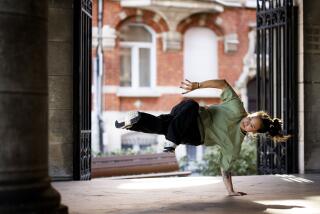Toutz’s Eye Is on the Birdie : Olympic Badminton Coach Glad for Chance to Help Sport’s Image
GARDEN GROVE — When Vicki Toutz was named to coach the U.S. Olympic badminton team in Barcelona, she saw it not only as a major opportunity but also a chance to change the image of the sport.
Toutz, who has been coaching at Garden Grove High School since 1961, received word of her appointment to the U.S. team May 1 from the U.S. Badminton Assn. Badminton will be a medal sport for the first time in Barcelona, and Toutz will be in charge of the U.S. six-person contingent.
“It’s getting exciting,” Toutz said. “When you get an honor like that, you’re excited and enthused, but as the time gets nearer, oh my goodness, pinch me.”
While Toutz is justifiably excited about her job in Barcelona, she is just as enthused about what this portends for the future of badminton. It is a sport that Toutz admits has an image problem.
“I think it is definitely going to help the image of the sport in this country,” Toutz said. “The exposure is going to give it credibility. A lot of people are only familiar with the back-yard variety. Young people need to see how competitive and athletic it is, and the Olympic exposure will help.”
Currently, Toutz says the only exposure Americans have had is to the back-yard version.
“The image is to go to the local sporting goods store, buy a cheap set with the nylon shuttlecock, set it up at a picnic or at the beach and play for fun,” she said. “It never gets beyond that.”
The badminton people will see in Barcelona will be considerably different, Toutz said. There, people will see a sport played indoors by athletes smashing a feathered shuttlecock more than 150 m.p.h. with $130 rackets.
“You need tremendous quickness, agility and strength to compete (in the international arena),” Toutz said. “You also need great jumping ability. The game is no longer played on the ground. The Asians changed the game like they did to volleyball. It also requires aerobics, stamina and endurance. A match can last 45 minutes to 1 1/2 hours, and there are no timeouts.
“It is also very hard on the body. There are a lot of injuries to the knees, Achilles’ tendons and shoulders. There is a lot of explosive work. It’s so quick and so fast, that the reflexes needed are incredible.”
Ironically, the United States was once dominant in international badminton competition before the Asians and Northern Europeans mastered the sport.
“In the 1950s, men and women (in the United States) were the tops in the world,” Toutz said. “We were winning the Thomas Cup (for men) and the Uber Cup (for women), which were the top tournaments in the world.”
But two trends changed that situation: the ascendancy of the game in Asia and the gutting of programs in the United States, according to Toutz.
“The rest of the world--particularly Asia--developed the sport at a higher level,” Toutz said. “The game became more explosive and sophisticated. They developed a professional approach to the game with early screening for prospective athletes and high-tech training programs.
“Now the level of badminton in Asia--particularly countries like China, Indonesia and Korea--is on the level of our ‘Dream Team’ in basketball. Their top players perform at the level of our (Magic) Johnsons or (Michael) Jordans. They’re professionals. They get tuition, room and board, travel and win money. It’s a lucrative sport for them.”
It is also a sport that is taken very seriously, Toutz said.
“In China, Malaysia and Indonesia, you’ll see 20,000 people filling an indoor arena watching badminton,” she said. “They boo the opponents, and, at some matches, all the fans wore white so the other team couldn’t see the birdie. In Malaysia, the fans have been so rowdy, they’ve had to postpone games.”
While the game has been soaring in Asia, the Scandinavian countries and England, it was hitting hard times in the United States.
“When the NCAA picked up college women’s sports, badminton had to fall under (their) regulations,” Toutz said. “Schools like UCLA, Stanford, San Diego State and Long Beach State had highly organized programs on a co-ed basis. The community colleges also had strong programs.
“But not enough colleges had organized, budgeted programs, and the NCAA didn’t pick up badminton. Percentage-wise, not enough schools had it for (the NCAA) to back a championship. In California, it was always strong, but after Proposition 13, all the community colleges, which had full programs and wide participation, axed badminton. Once a program is dropped, it’s tough to get it back.”
Despite the setbacks, Toutz believes the United States again can challenge for badminton supremacy.
“I see no reason why the United States can’t have top international players,” she said. “We need sponsorships because a lot of the training has to be done abroad to seek out the competition. We need places to play so the sport can attract (young athletes). But where can they play? Trying to get gym time is difficult. We lack facilities and coaches.”
But Toutz is hoping the Olympic exposure will help to alleviate the situation.
“The Olympics should help the national organization to better organize the junior programs,” she said. “With the 1996 Games in Atlanta, it’s a perfect opportunity for the USBA to organize regional and national junior training sites. (Lack of) facilities are a big problem.”
Toutz believes there are two good reasons for optimism--the increasing level of competition on the high school level in Southern California and the growing number of immigrants from Asia.
“Putting boys and girls together (in the co-ed format) brought in strong boy athletes,” she said. “And, in turn, girls saw the kind of sport it was and it attracted strong girl athletes.
“The immigration of Asians has increased the number of players, and they have brought with them a knowledge of the game, so the level and depth of competition is more difficult.”
But channeling that talent into advanced training programs will take work, Toutz said.
“The USBA is devising a system to attract immigrants as well as citizens,” she said. “(Under U.S. Olympic Committee rules) they have to be naturalized U.S. citizens so they can take advantage of the funding. They need to take steps toward citizenship. No one in the United States would deny anyone from competing for the United States (in the Olympics) if they meet USOC requirements.
“There is an opportunity for U.S. athletes to be Olympians in badminton. There are less numbers and there is opportunity to travel throughout the world, financial assistance and scholarships. It is an American dream to become a citizen and represent this country in the Olympics.”
Toutz’s playing career began while she was attending Long Beach City College. After graduating in 1958, she set her racket aside for the next seven years to complete her undergraduate degree at Long Beach State and start her teaching career at Garden Grove.
In 1965, on a bet from a friend, Toutz entered a tournament at Fullerton High School, spotted 10 points to an opponent and won. Eventually, she became more involved in local tournaments and hired a personal coach from Thailand, but he became ill after three months.
Toutz trained under David Ogata in Manhattan Beach for more than a year and received an invitation to the national championships in singles.
“I owe a great deal to both gentlemen,” Toutz said.
By 1971, Toutz was the No. 2 ranked women’s singles player in the United States and was a member of the Uber Cup team. In 1981, she represented the United States in the Uber Cup in women’s doubles. From 1982-84, Toutz was the U.S. senior doubles champion. She was also U.S. senior mixed doubles champion from 1980-82 and 1984-85.
Toutz also served as coach of the national women’s team in Uber Cup competition from 1984-86.
During the past three years, Toutz served as chairman of the USBA’s international competition committee where she became involved in overseeing the rankings and other programs involving elite athletes.
“The most important part of the job was to be a friend of the elite athlete,” Toutz said. “In the past, that had been overlooked.”
Eventually, the job led to her appointment as Olympic coach.
“I don’t think we’re in contention for any medals,” Toutz said. “I dream of being in the medal matches. Our athletes are dedicated, but, obviously, the United States is not on a par with the top four countries. But I think we can win some matches.”
Regardless of the results, Toutz is thrilled about her situation.
“It’s a dream come true,” she said. “I’ll represent the United States in a sport I love. I eat and breathe sports. I’ll be emotional when I enter the arena.”
More to Read
Go beyond the scoreboard
Get the latest on L.A.'s teams in the daily Sports Report newsletter.
You may occasionally receive promotional content from the Los Angeles Times.






